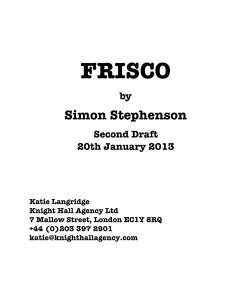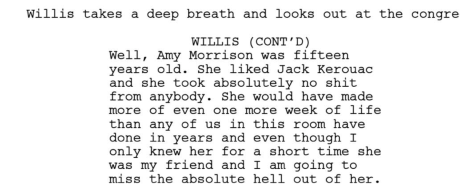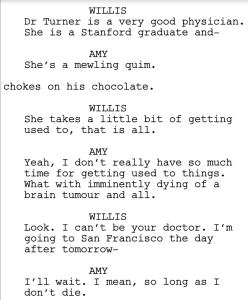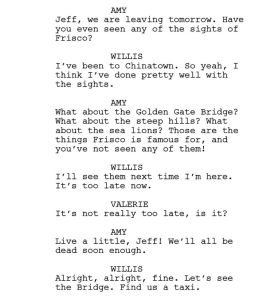Remember that climactic boardroom scene in The Social Network when Mark Zuckerberg says to Cameron and Tyler Winklevoss (aka “the Winkelvi”) — “If you could’ve invented Facebook, you would’ve invented Faceook“?
Yesterday Tatiana Siegel’s shocking 3.9.24 Variety story explored a claim by Frisco author Simon Stephenson that The Holdovers director Alexander Payne and/or the film’s screenwriter, David Hemingson, plagiarized portions of Frisco almost on a scene-by-scene, line-by-line basis.
Hollywood Elsewhere’s response to Stephenson: “If you could’ve written The Holdovers, you would’ve written The Holdovers.”
HE read a 2013 draft of Frisco this morning, and I’m not claiming that Stephenson is totally out to lunch on this matter. Yes, there’s a cetain thematic similarity and similar story strands shared by Frisco and The Holdovers.
Frisco is essentially a spiritual rebirth story in which Jeff Willis, a morose 50something Seattle pediatrician, is reawakened by Amy Morrison, a 15 year old terminal cancer sufferer, and how it all comes together during a brief shared trip to San Francisco.
In certain ways The Holdovers tells the same kind of story — Paul Giamatti‘s Paul Hunham, an ascerbic classics professor at a private Massachusetts boys school, experiences a spiritual reawakening while looking after a bright but contentious senior, Dominic Sessa‘s Angus Tully, and how it all comes together during a late-second-act trip to Boston over the Christmas holidays.

And yet Frisco and The Holdovers are also strikingly similar to (a) Johanna Spyri‘s Heidi (i.e., young girl reawakens the humanity of her grumpy grandfather), (b) Gus Van Sant and Mike Rich‘s Finding Forrester (’00 — a talented young writer of color reawakens a hermit-like, J.D. Salinger-like writer, and (c) Martin Brest and Bo Goldman‘s Scent of a Woman (’92 — private-school kid reawakens the heart and soul of a bitter retired military man).
Another similarity that hit me this morning was (d) Morton DaCosta, Betty Comden and Adolph Green‘s Auntie Mame (“Live a little!”) except this time the Rosalind Russell role is handled by Amy, the cancer kid. But the mission is basically the same.
Just as Mame eventually saves Patrick Dennis (author of the original 1955 book, and played by Roger Smith) from a life of conservative suffocation, Amy the cancer victim saves the morose and timid Willis from a life of terminal resignation and boredom.
For me, the key difference between Frisco and The Holdovers is that the latter is wise and well written and recognizably human and specific in dozens of different ways while Frisco is somewhat generic and plodding, not to mention awkwardly written here and there and occasionally speechy in a way that almost makes you groan.
I was a script reader in the mid to late ’80s, and I’ve read hundreds of interesting but not-quite there scripts in my time. Frisco is definitely one of these.
It’s not awful but it is, I feel, on the mediocre side. It needs a major rewrite or whatever. And it’s really whorish, I feel, to use a terminally ill teenager as the driving spiritual engine of the piece. And to throw in the lore of San Francisco beat generation mythology (City Lights bookstore, Jack Kerouac, Neal Casady, Lawrence Ferlinghetti, “Howl”) as icing on the spiritual cake….well, okay, but it struck me as a bit precious.
Frisco is primarily composed of a series of vaguely awkward, on-the-nose, “this is who I am and what I want or need” scenes…essentially a lot of cliched material about a midlife crisis of the spirit (including an impending divorce) and how a 50ish guy is gradually rescued.
The on-the-nose theme of Frisco is “stop being morose, celebrate your time here on earth, we’ll all be dead soon enough.”
Pediatrician Jeff Willis is a morose loser type who, not unlike George C. Scott’s Herb Bock in The Hospital, has more or less given up on his life. The difference is that Bock is at least bitter and enraged about the decline of his life and place of work. Plus he falls in love with the leggy Diana Rigg at midpoint, main due to her having prevented him from drunkenly killing himself, which leads to his ravaging her three times.
Paul Hunham is suffering from accumulated bitterness over having been falsely accused of plagiarism at Harvard by some snotty privileged kid (whom he tried to subsequently hit with his car) and an overly judgmental and acerbic attitude towards snotty entitled students.
Snarky, withering Hunham is at least interesting while Willis is not — the latter is mainly a self-deluding downer, a Gloomy Gus and a general drag to hang out with.
The Holdovers is a wise, compassionate, grade-A, character-driven period drama that’s basically a smoothly assembled three-hander (Paul Giamatti, Dominic Sessa, Da’Vine Joy Randolph).
Frisco is basically a half-clunky, half-lumpy, occasionally close-to-embarassing read that has a certain emotional intrigue here and there but didn’t get produced for obvious reasons.
HE commenter Don Logan:
“This is idiotic. By Payne’s own admission The Holdovers is based on a 1937 film by Marcel Pugnol, Merlusse, that he had seen at some screening at a French film festival a couple of years prior.
“IMDB synopsis: “Merlusse is a teacher in an all-boys boarding school. Pupils hate him since he smells, has a glass eye and is very strict. When Christmas Eve arrives most boys leave school to spend the holidays with their families but a small group of lonely boys is left behind with Merlusse as their overseer. Merlusse doesn’t get along with the boys very well and they pull various tricks on him but on Christmas morning the boys awake to find a huge surprise waiting for them…”
“If I remember correctly Hemingson had approached Payne with a script set at a Boston boarding school. Payne liked the local flavor and Hemingson’s knowledge about those schools and asked him to combine that with the basic story of Merlusse. That’s what he told an audience at the Lumière Film Festival in Lyon back in October with Hemingson by his side.
“Edit: This is even in Siegel’s story. I’d say it’s telling that she doesn’t follow up on that.”
Willis’ eulogy for the departed Amy:

Final HE observation: Before reading Frisco I had never considered that a person could be described as “a mewling quim.”
>
One more excerpt:














